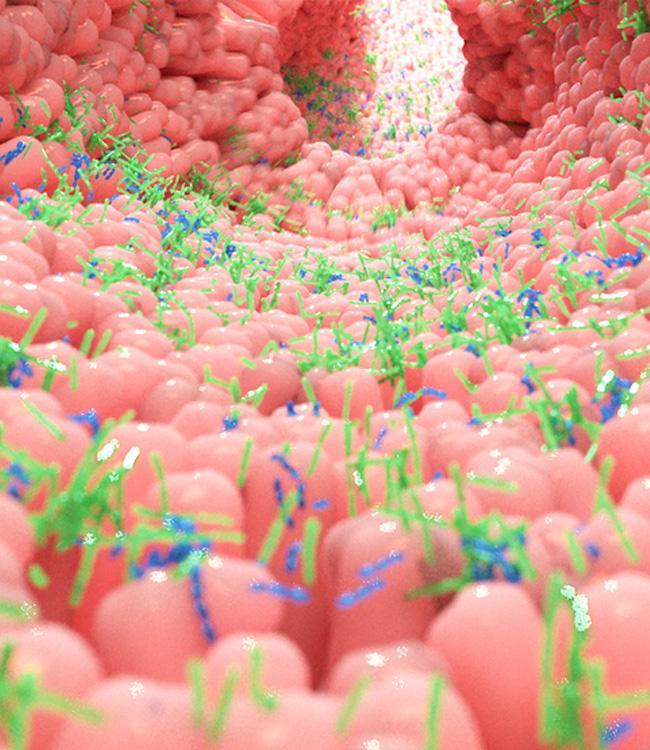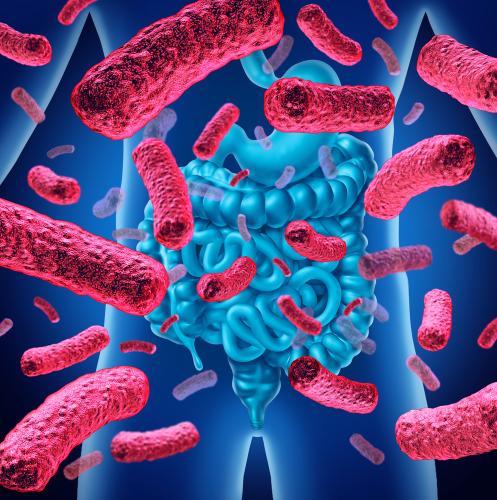Bacteria: friend or foe?
Until recently, bacteria were considered to be related to disease rather than good health. It’s true: many bacteria are unhealthy and cause disease. Some of them are even fatal, such as staphylococcus, the main agent for nosocomial infections. Others are vital for staying healthy.
The reputation of bacteria has been restored by advances in research and technical expertise. After almost two decades of research, there are now hundreds of scientific publications which prove the health benefits of bacteria.
Bacteria do not all have the same effects. Increased knowledge has led to the creation of categories which are used to make “cocktails” of beneficial bacteria. These cocktails are called probiotics.
Probiotics
The word “probiotic” comes from the Greek words “pro” which means “beneficial” and “biotikos” which means “life”.
In 2001, probiotics were defined by the World Health Organisation (WHO)1 as “live micro-organisms which, when administered in adequate amounts, confer a health benefit on the host, apart from the traditional nutritional effect.”

What is intestinal microbiota?
Gut flora, or intestinal microbiota, are all the micro-organisms living in our intestines, which, in this case, indicates the small intestine and large bowel or colon.
In concrete terms, probiotics, or microbiotic strains, temporarily reinforce gut flora to re-establish the balance between good and bad bacteria, giving good bacteria an advantage over the bad.

The positive effect on health is proportionate to the number of good bacteria.
The existence of bacteria in the gut is not innocuous because they influence many functions, including:
- digestion;
- synthesis of vitamins B and K;
- production of molecules which are vital for the body including short-chain fatty acids;
- boosting the immune system;
- creating a barrier to prevent bad bacteria from colonising the intestine.
How microbiota affect health
Many studies have shown that the quality of intestinal microbiota is closing related to a range of health parameters and diseases2:
- digestion: bloating, constipation, diarrhea;
- inflammatory bowel diseases: ulcerative colitis and Crohn’s disease;
- diabetes;
- obesity;
- some cancers;
- neuropsychiatric disorders: autism, schizophrenia, anxiety, depression, bipolar disorders.
Scientific proof
Both the scientific and medical professions agree on the benefits of probiotics3. Studies have been conducted in a range of situations to provide a wide perspective on their effect on our health.
Benefits have been proven for:
- preventing antibiotic-caused diarrhea (see the study);
- improving irritable bowel syndrome (see the study);
- treating constipation (see the study) and improving bowl movement (see the study);
- providing relief of symptoms associated with lactose intolerance (see the study);
- treating allergies (see the study);
- combating Helicobacter pylori bacteria responsible for inflammation in the stomach (chronic gastritis) which can lead to ulcers and cancer (see the study).
Different strains of probiotics for different actions
Many different bacteria exist, but only some are eligible to be called probiotics. The main example is lactic acid bacteria: the bacteria which ferment the sugars in lactic acid. There are four types: lactobacillus, bifidobacterium, streptococcus and lactococcus. Each type has thousands of species and hundreds of thousands of strains, and even more in some cases.
Each strain has specific properties. There is no single, universal probiotic. Each specific strain which has been tested and proven effective is linked to a specific health problem.
Current available data shows that certain strains have specific effects (incomplete table):
| Strains | Effect(s) | Study |
|---|---|---|
| Lactobacillus rhamnosus | Prevention of antibiotic-caused diarrhea |
Armuzzi et al, 2001 published in "Alimentary and Pharmacology Therapy, 15, 163-169" |
| Bifidobacterium longum, Lactobacillus helveticus, Lactococcus lactis, Streptococcus thermophilus | Prevention of irritable bowel syndrome with constipation | Drouault-Holowacz et al., 2008 published in "Gastroentérologie Clinique et Biologique, 32, 147-152" |
| Lactobacillus gasseri | Boosting the intestinal barrier | Alard et al. 2018 published in "Benefical Microbes" 9(2): 317-331 |
| Lactobacillus plantarum | Prevention of vulvovaginal candidosis | Palacios et al, 2016 published in "European Journal of Clinical Microbiology & Infectious Disease 2016 Oct; 35(10): 1701-8." |
Each strain is therefore unique and cannot replaced. Their properties are specific and cannot be extrapolated to other strains of the same species.
Criteria for choosing probiotics
Certain criteria must be considered when choosing probiotics to ensure their quality and effectiveness.
- Identified strain(s)
It is crucial to choose probiotics with strains which have been tested for their effectiveness. - Proven gastro-resistance
When a probiotic is ingested, it passes through extreme environments and must resist stomach acidity, digestive enzymes, bile salts, etc. Their effectiveness depends on their ability to survive such conditions and reach the small intestine and colon. - Traceability
Traceability using standardised processes ensures consumer safety and guarantees product registration, as well as manufacturer reactivity when necessary.
Choose probiotics made by companies with stringent pharmaceutical-industry practices. They must have significant experience in working with living materials and be regularly controlled by the appropriate authorities. - Strain stability
This characteristic guarantees the viability over time of the probiotic in the ambient environment (temperature/humidity) when preserved in normal conditions.
Stability depends on the characteristics of the strain, and the choice of ingredients used to create the probiotic. The packaging chosen to protect the product from air and humidity, preferably sachets or capsules in blister packs, also affects stability. - Adhesion to intestinal mucus
This describes the probiotic’s capability to adhere to the cells in the intestines. When adhesion is sufficient, the probiotic strains stay in the intestines longer. Unless administered in very high quantities, probiotics only pass through the body. Good adhesion optimises the interaction between the microbiota and the systems targeted, such as the immune system.
How to match a probiotic with these criteria: good reflexes
Thanks to training and regular updates, an increasing number of health professionals such as doctors and pharmacists can advise about which probiotics to use for which condition.
Consult a doctor or pharmacist for advice when choosing probiotics. They are a source of precious advice.






